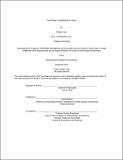Real estate crowdfunding in China
Author(s)
Tang, Renjie,S.M.Massachusetts Institute of Technology.
Download1135864260-MIT.pdf (1.136Mb)
Other Contributors
Massachusetts Institute of Technology. Center for Real Estate. Program in Real Estate Development.
Advisor
David Geltner.
Terms of use
Metadata
Show full item recordAbstract
As FinTech and online alternative finance has become a disrupter for the world, one of their subcategories, crowdfunding has a considerable potential to change the real estate industry. The study was to examine the real estate crowdfunding (short for RECF) in China and understand the present status of the industry, challenges, opportunities, and trends. The data mainly came from the Chinese crowdfunding websites, industry reports, and the RECF platforms; the methodology included fundamental data analysis, case study and comparison with the RECF in other regions such as US, UK, and Europe. The study started with an introduction of real estate FinTech, crowdfunding, and theoretical framework about RECF as well as the global RECF market to get a better understanding of the RECF in China. Then the research examined the history, and current status about the platform models, players, and characteristics of the RECF in China; the two representative cases (Duocaitou and Kaishiba) were are analyzed in detail to interpret the drivers under their successes and problems in general. The study found out the possible challenges for the RECF industry in China, including the blurred regulatory environment, low diversification in types and locations of properties and immature platforms as well as low desire to expand globally. Finally, the research attempted to seek for potentials and recommendations that will ultimately lead to the successful future development of this industry. The study was subject to the limitations on accessibility to the database and timeliness of data in such a changing industry. However, its findings and suggestions can be useful to players who are supposed to engage in the RECF ecosystem and intend to involve in the RECF in China such as regulators, real estate developers, institutional or retail investors, and RECF startups. Future researches are necessary to understand the effectiveness of risk management systems on the RECF platforms, the ways that the institutional players can involve in the industry, the globalization of the Chinese RECF, and mechanism of RECF ecosystem.
Description
This electronic version was submitted by the student author. The certified thesis is available in the Institute Archives and Special Collections. Thesis: S.M. in Real Estate Development, Massachusetts Institute of Technology, Program in Real Estate Development in conjunction with the Center for Real Estate, 2019 Cataloged from PDF version of thesis. Includes bibliographical references (pages 84-86).
Date issued
2019Department
Massachusetts Institute of Technology. Center for Real Estate. Program in Real Estate Development; Massachusetts Institute of Technology. Center for Real EstatePublisher
Massachusetts Institute of Technology
Keywords
Center for Real Estate. Program in Real Estate Development.